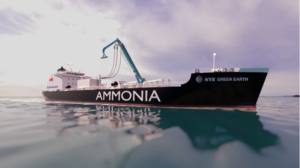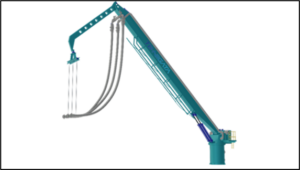31 July 2024 – ClassNK has issued an Approval in Principle (AiP) for a design concept of the ammonia fuel bunkering boom*1, which is jointly developed by Nippon Yusen Kabushiki Kaisha (NYK Line) and TB Global Technologies Ltd. This is the world’s first AiP certification for the design of a bunkering boom for ammonia fuel*2.

As ammonia fuel utilization is expected in shipping for decarbonization, bunkering vessels that supply fuel to ships and related equipment will play an essential role in the supply chain. On the other hand, due to the novelty, it can be difficult to confirm the safety of some equipment by applying existing rules.
Targeting such new technologies, ClassNK has issued the ‘Guidelines for Technology Qualification’ that define a certification process to demonstrate that an acceptable level of safety, equivalent to that of technologies designed under existing rules and standards, has been verified. Through the guidelines, ClassNK is providing a risk-based approach to safety assessment for the implementation of new technology.

ClassNK carried out a drawing review of a basic design of the bunkering boom based on part N of its ‘Rules and Guidance for the Survey and Construction of Steel Ships’ for ships carrying liquefied gases in bulk, and conducted a review of documents required by the ‘Guidelines for Technology Qualification’. Upon confirming they comply with the prescribed requirements, ClassNK issued the AiP.
ClassNK will continually strive to contribute to advanced decarbonization initiatives through safety assessments and more.
*1 Ship-to-Ship Fuel transfer equipment installed on bunkering ships
*2 The ‘world’s first’ claim is as of July 31, 2024, according to TB Global, the entity responsible for obtaining the AiP.
Approval in Principle (AiP):
At the initial stage of designing or before the specific target ship to be implemented is decided, the design is examined based on the existing regulations such as international conventions and ship classification rules, and an Approval in Principle (AiP) is issued as proof of conformity with requirements. It also prevents rework of regulatory aspects in the post-process, shortens the examination time at the time of class registration, and can be used as a technical basis for external appeal of the design status. For more information, visit our website.
